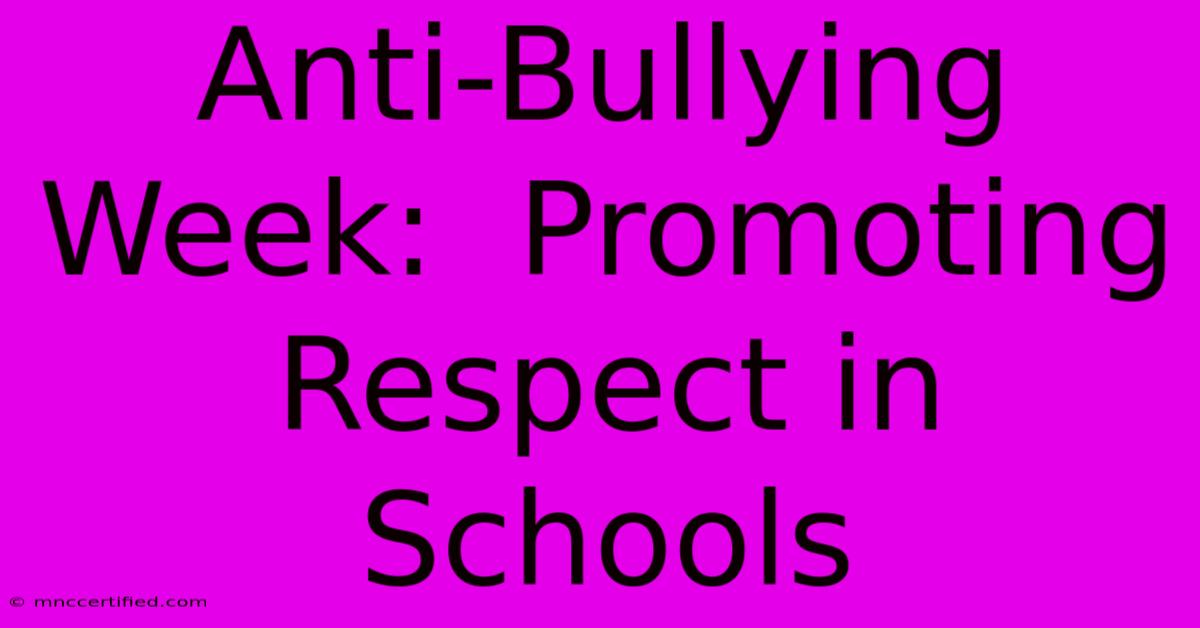Anti-Bullying Week: Promoting Respect In Schools

Table of Contents
Anti-Bullying Week: Promoting Respect in Schools
Anti-Bullying Week is a crucial time to raise awareness about bullying and encourage a culture of respect in schools. This annual event, usually held in November, provides a platform to empower students, teachers, and parents to take a stand against bullying and foster a safe and inclusive learning environment for everyone.
Understanding Bullying: Beyond Physical Acts
Bullying is not just about physical violence; it encompasses a range of behaviors intended to hurt, intimidate, or isolate someone. This can include:
- Verbal bullying: name-calling, insults, threats, teasing, and spreading rumors.
- Physical bullying: hitting, kicking, shoving, tripping, or damaging someone's property.
- Cyberbullying: using electronic communication to bully, harass, or threaten someone. This includes posting embarrassing photos or videos, sending mean texts, or spreading rumors online.
- Social bullying: excluding someone from a group, spreading rumors, or manipulating social situations.
The Impact of Bullying: More Than Just Hurt Feelings
The consequences of bullying can be severe and long-lasting. Victims of bullying may experience:
- Emotional distress: anxiety, depression, low self-esteem, and feelings of isolation.
- Physical health problems: headaches, stomach aches, sleep problems, and changes in eating habits.
- Academic difficulties: decreased grades, poor concentration, and school absenteeism.
- Increased risk of self-harm and suicide: In severe cases, bullying can lead to suicidal thoughts and actions.
Creating a Culture of Respect: Everyone's Role
Preventing bullying requires a collaborative effort from everyone in the school community.
For Students:
- Speak up: If you witness bullying, report it to a trusted adult.
- Be an upstander: Don't be a bystander. Intervene when you see someone being bullied, even if it's just offering a kind word or a helping hand.
- Practice kindness: Be respectful of others, even if you don't agree with them.
- Be inclusive: Welcome and include everyone, regardless of their differences.
For Teachers:
- Create a classroom culture of respect: Establish clear rules and expectations for behavior and enforce them consistently.
- Model respectful behavior: Treat all students with respect and kindness.
- Educate students about bullying: Discuss different types of bullying, its impact, and how to prevent it.
- Provide support for victims of bullying: Offer guidance and resources to help students who are being bullied.
- Work with parents: Communicate with parents about bullying prevention and support their efforts.
For Parents:
- Talk to your children about bullying: Openly discuss bullying and encourage them to report any instances.
- Be a good role model: Model respectful behavior in your own life and teach your children the importance of treating others with kindness.
- Stay involved in your child's school: Attend school events and get to know the staff and other parents.
- Support anti-bullying initiatives: Participate in Anti-Bullying Week activities and support organizations that work to prevent bullying.
Resources and Support
Numerous resources are available to help combat bullying. Here are a few:
- StopBullying.gov: A website by the U.S. Department of Health and Human Services with information on bullying prevention, resources, and reporting.
- PACER's National Bullying Prevention Center: A non-profit organization dedicated to ending bullying and creating safe schools for all.
- The Bully Project: A documentary film and organization that raises awareness about bullying and encourages empathy and compassion.
Conclusion
Anti-Bullying Week is an opportunity to make a difference. By working together, we can create a culture of respect in schools where all students feel safe, supported, and valued. Let's stand united against bullying and foster a positive and inclusive learning environment for everyone.

Thank you for visiting our website wich cover about Anti-Bullying Week: Promoting Respect In Schools. We hope the information provided has been useful to you. Feel free to contact us if you have any questions or need further assistance. See you next time and dont miss to bookmark.
Featured Posts
-
First American Insurance Chicopee Ma
Nov 11, 2024
-
Wales Errors Cost Warren In Fiji Defeat
Nov 11, 2024
-
Saints Beat Falcons 20 17 In 2024 Game
Nov 11, 2024
-
Paddy Mc Guinnesss Children In Need Charity Cycle
Nov 11, 2024
-
Arrowhead Stadium Roars Chiefs Broncos Face Off
Nov 11, 2024